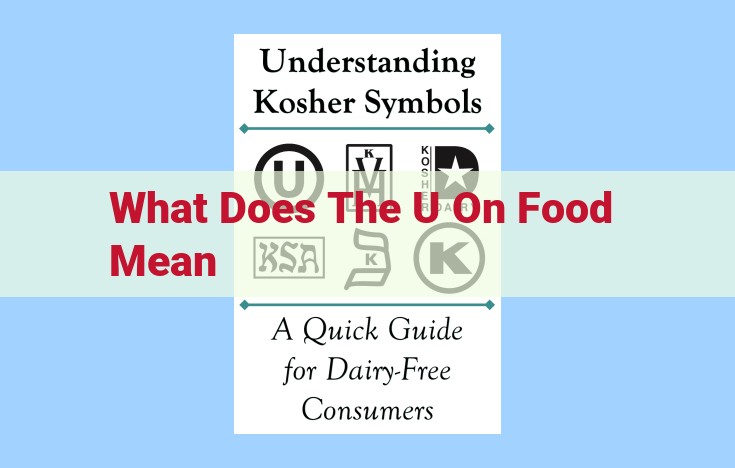Usda “U” Mark: Ensuring Wholesome And Accurately Labeled Meat, Poultry, And Eggs

The “U” marking on food packaging denotes USDA inspection. The Food Safety and Inspection Service (FSIS) of the United States Department of Agriculture (USDA) is responsible for ensuring the safety and labeling accuracy of meat, poultry, and egg products. The “U” mark signifies that the product has been inspected and meets USDA standards for wholesomeness, sanitation, and ingredient labeling.
Government Agencies
- United States Department of Agriculture (USDA)
- Food Safety and Inspection Service (FSIS): Explain the role of FSIS in ensuring the safety of meat, poultry, and processed egg products.
- Food and Drug Administration (FDA)
- National Organic Program (NOP): Describe the USDA’s National Organic Program, its regulations for organic food production, and its certification process.
Government Agencies Ensuring Food Safety and Organic Integrity
Ensuring the safety and integrity of our food supply is a paramount concern. Government agencies play a crucial role in safeguarding consumers and upholding stringent standards that govern food production and distribution. Among these agencies, the United States Department of Agriculture (USDA) and the Food and Drug Administration (FDA) stand out as primary entities responsible for regulating food safety.
United States Department of Agriculture (USDA)
The USDA is a prominent federal department responsible for various aspects of food production and regulation. Within the USDA, the Food Safety and Inspection Service (FSIS) holds the primary duty of ensuring the safety of meat, poultry, and processed egg products. FSIS achieves this through inspections, enforcement of regulations, and public health surveillance.
Food Safety and Inspection Service (FSIS)
The FSIS’s comprehensive oversight extends from the slaughterhouse to the retail shelf. Inspectors monitor animal health and processing facilities, examine meat and poultry for any sign of disease or contamination, and ensure compliance with labeling requirements. By adhering to these rigorous protocols, FSIS helps prevent foodborne illnesses and ensures the safety of the meat, poultry, and egg products we consume.
Food and Drug Administration (FDA)
The FDA, another vital federal agency, plays a significant role in regulating food safety and the production of organic food. The FDA’s National Organic Program (NOP) establishes national standards for organic agriculture, ensuring that food products labeled as “organic” meet strict criteria.
National Organic Program (NOP)
The NOP’s comprehensive regulations govern organic food production, including farming practices, livestock management, and processing methods. By adhering to these standards, certified organic farmers and processors can ensure the integrity of their products, meeting the increasing demand for organic and sustainably sourced food.
Industry Organizations: Shaping the Meat and Poultry Industry
At the heart of the meat and poultry industry lie a wealth of organizations dedicated to ensuring the safety, quality, and advocacy of this vital sector. One such organization is the American Meat Institute (AMI), a profound force representing the industry’s interests and shaping its trajectory.
AMI: A Stalwart Advocate for the Meat and Poultry Industry
Founded in 1906, AMI stands as a pillar in the meat and poultry industry, representing companies of all sizes, from small and family-owned to global powerhouses. Its mission is multifaceted, encompassing the representation of industry interests, promoting industry standards, and advocating on behalf of the sector.
Representing Industry Interests
AMI serves as the voice of the meat and poultry industry, representing its concerns and perspectives to policymakers, regulators, and the public. It actively engages in legislative and regulatory processes, ensuring that the industry’s interests are heard and understood.
Promoting Industry Standards
AMI is passionate about fostering high standards of food safety, quality, and sustainability in the meat and poultry industry. It develops and promotes industry-wide best practices, providing guidance to industry members on how to meet and exceed regulatory requirements.
Advocating on Industry’s Behalf
AMI plays a crucial role in advocating for the interests of the meat and poultry industry. It educates policymakers and the public on the importance of the industry to the economy and to global food security. AMI’s unwavering advocacy helps to ensure that the industry’s voice is recognized and that its interests are protected.
Industry organizations like AMI are essential partners in the meat and poultry industry. They provide a collective voice for the sector, promote high standards, and advocate for its interests. Through their tireless efforts, they help to ensure that the industry remains safe, sustainable, and thriving, meeting the ever-growing demands for meat and poultry products worldwide.